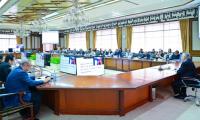The fourth edition of the two-day Adab Festival kicked off at the Frere Hall in Karachi on Saturday with the theme of climate change.
To match the theme, the keynote speakers at the inaugural session of the festival were Federal Minister for Climate Change Sherry Rehman and environmentalist Tariq Alexander Qaiser. They delivered their keynote addresses after a rendition of the national anthem and the anthem of the Adab Festival by a group of pupils of St Joseph’s Convent School.
Call for climate literacy
Sherry began her speech by thanking Ameena Saiyid, the co-founder of the festival, for choosing climate change as its theme. She said climate change was a crisis of many proportions that impacted everything, from people to industries and agriculture, the coffee that we drank and the showers we took.
She was of the view that climate action would never be successful, nor would it yield the optimal outcome until the citizens were directly involved and saw themselves as the key stakeholder. “Urban elites need to act as much or perhaps even more than the state,” she added, explaining that she did not mean to abdicate her responsibility by asking the citizens to act like the main stakeholder.
Given the scale and enormity of the crisis, the minister emphasised that every single person in whatever small capacity they had needed to take action to bring the outcome to the table and educate children about the possible future they would have to face if the climate issue was not addressed.
She lamented that the dystopia had come to Pakistan’s doorstep despite the fact that it was the least contributor to carbon emissions.
The climate change minister remarked that Pakistan had become the ‘ground-zero’ of climate change and the world needed to realise that because for three successive years, Pakistan had been home to the hottest cities of the planet and 53.7 degrees Celsius was not fit for agriculture, industrial production or any activity inside or outside.
“We all need to be climate literate and make climate impactful decisions like in how much water we consume everyday be it a bath, men shaving or women washing clothes. The amount of water you save can actually save lives and the country from the future of water scarcity,” Sherry stressed.
“It is a great irony of our times that in many parts of Sindh, there was more water than the size of the United Kingdom for instance, but it was not usable nor savable for future use. While there is water, water everywhere, there will not be a drop to drink.”
She stated that when there was a shortage of any commodity, elites were the first to have access to it and the vulnerable and poor segments of society were the last to use any of it.
“For us, 2030 is the decisive decade and not 2050 like the rest of the world. All actions have to be taken within this decade,” the minister emphasised, terming the establishment of a ‘loss and damage fund’ at the recently held COP27 climate summit a big victory. The fund is aimed at helping poor countries bear the cost of climate-triggered events such as rains.
She said the recent monsoon floods impacted 33 million people in Pakistan, a country with the size of three medium-size European countries.
“How will you feed people or give them relief or even humanitarian assistance when you are drowning both in water and debt?” she asked, calling for a reset in people’s lifestyle as well as how they allocated resources.
‘Reset required’
The other keynote speaker, Qaiser, said that these were times of great change as global warming was posing an existential threat to human society.
He remarked that though the recent rains wreaked havoc in parts of the country, they turned out to be a boon for the Indus delta as the production of mangrove seeds was beyond what he had seen in the last decade and a half.
He lamented that lobbying for big businesses and fossil fuel continued despite the known disastrous consequences. Stating that big businesses and industries had made incredible profits in the last few years, he said the size of the economic pie was shrinking but hunger to acquire even larger and larger pieces continued. He pointed out that biodiversity of nature and human culture had flourished during the previous ten thousand years and that era is called Holocene, but it lasted till recently, till the appearance of our generation.
During this short period of less than 100 years, he explained, all had changed as “our hunger for larger and larger size of the pie has actually made the pie much, much smaller.”
Qaiser said he was not despondent as there would be new innovations and solutions but asked at what speed and scale they would have impact.
“We humans live exploitative and destructive lives. Every tree will be cut and trunk will be replaced by a column of concrete. There is a disconnect between the manner in which we exist and aspirations in which we wish to survive,” he said, stressing that a reset seemed inevitable.
Dr Nauman Naqvi of Habib University said climate change was a topic of unprecedented significance today, especially in Pakistan that was on the forefront of climate catastrophe the world had started to witness recently. Many in the country were still witnessing the devastating aftermath of the unprecedented floods, he added.
A movement
In her welcome address, Ameena said it was the first in-person Adab Festival being held after the demise of her partner Asif Farrukhi who had co-founded the festival with her.
She said the the previous edition of the festival was held online in collaboration with the UK’s Bradford Literature Festival (BLF). “When Asif Farrukhi and I began literature festivals in Karachi in 2010, we wanted to create a model and a movement that would spread across the country. To our delight that has happened as literature festival are being held in Karachi, Lahore, Islamabad and other cities,” she maintained.
“But there was another motive: we wanted to honour and celebrate our world class authors and artists and at the same time provide a platform to emerging talent.”
She pointed out that she and her current partner Shama Askari had added a new dimension to the event, which was to groom and promote others to whom they could pass on the baton and continue the legacy of holding such events.
She thanked Karachi Administrator Murtaza Wahab for allowing the event to be held at the beautiful venue of the Frere Hall.
She also expressed gratitude to poetess Zehra Nigah for encouraging and supporting them.
Later, Zehra also addressed the ceremony stating that such festivals helped compile our history. She said such festivals were important because we could talk to each other and have question and answer sessions where people asked questions and give answers with freedom. “This freedom is also a blessing in these times,” she remarked.
She pointed out that special literature was produced in the times of pandemic as famous novels had been written on plague and cholera epidemic. She also recited some Urdu couplets on the flood disaster such as "Azaab-e-Aab Mein Sarsabz Basti Ghir Gai Logo/ Parinde Ur Gaye, Jo Beh Gaye Bache Hamare Hain".
British Council Deputy Director Maria Rehman and Special Security Unit DIG Maqsood Ahmed also spoke at the inaugural ceremony that ended with a performance by classical dancer Sheema Kermani.
Various dialogues, interactive sessions, art shows and book launches were held throughout the day. A session titled ‘Uss Aadmi Ki Kami’ was also held to pay tribute to the late Farrukhi.
There was also an interactive children’s storytelling session on environment.
Mazar-e-Quaid can be seen in this image in Karachi. — AFP/File DastangoiT2F is hosting the Dastango group, who aim...
Policemen stand guard along a street in Karachi ahead of the general elections on February 1, 2024. — AFPDistrict...
Investiture ceremony of Karachi Corps was held. — PTIV RAWALPINDI: An Investiture ceremony of Karachi Corps was...
This image shows the logo of the Sindh Building Control Authority . — Facebook/Sindh Building Control...
The Sindh High Court building. — AFP/FileThe Singh High Court has directed the Karachi Water and Sewerage...
Logo of the Pakistan Customs Service.— Photo courtesy The News International/FilePersonnel of the Pakistan Customs...







